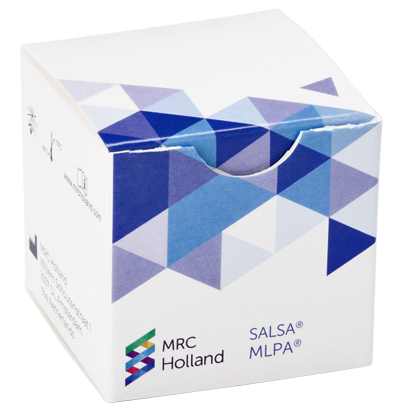SALSA® MLPA® Probemix P105 Glioma is a research use only (RUO) assay for the detection of deletions or gains in the following genes PDGFRA (4q12), EGFR (7p11.2), CDKN2A (9p21.3), PTEN (10q23.31), CDK4-MIR26A2-MDM2 (12q14-q15), NFKBIA (14q13.2) and TP53 (17p13.1). Moreover, this probemix can be used to detect the chr. 7 gains and chr. 10 losses and to detect the presence of TERT promoter mutations C228T and C250T.
Gliomas are the most common primary brain tumours and account for one third of central nervous system (CNS) tumours. Gliomas comprise a very heterogeneous group of CNS neoplasms derived from glial cells. There are several oncogenes and tumour suppressor genes, which have been shown to undergo copy number changes in gliomas. Somatic mutations, disruptions, or copy number aberrations in three critical signalling pathways, a) the RTK/PI3K pathway (involving e.g. EGFR, PDGFRA and PTEN genes), b) the p53 pathway (involving e.g. CDKN2A, MDM2 and TP53 genes) and c) the RB pathway (involving e.g. CDKN2A and CDK4 genes), are suggested to contribute to the development of gliomas (Cancer Genome Atlas Research Network 2008). Please see Table 2 in the product description for more details.
Epidermal growth factor receptor (EGFR) and its ligands are cell signalling molecules involved in diverse cellular functions. These include cell proliferation, differentiation, motility and survival, and tissue development. Glioblastomas often express EGFR variant III (EGFRvIII), a constitutively active genomic deletion variant of EGFR which is characterised by deletions of exons 2-7 of the EGFR gene (Sugawa et al. 1990). This probemix allows detection of deletions of EGFR that result in EGFRvIII. Please see Table 2 in the product description for more details.
Point mutations in TERT promoter region generate novel transcription factor binding sites and thus increase the expression of telomerase enzyme encoded by TERT. Common TERT promoter mutations are known as C228T and C250T, referring to C>T transitions at hg19/GCRh37 chr5:1295228 and chr5:1295250 positions, respectively. These mutations are predominantly present in oligodendroglioma and are associated with poor prognosis and reduced survival in the absence of IDH-mutation (Labussière et al. 2014). TERT promoter mutation, in combination with IDH-mutation and 1p/19q codeletion, is characteristic of oligodendroglioma. Absence of TERT promoter mutation, coupled with the presence of IDH-mutation, designates astrocytoma (Cahill et al. 2015; Eckel-Passow et al. 2015).






